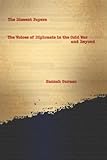The Dissent Papers : The Voices of Diplomats in the Cold War and Beyond / Hannah Gurman.
Material type: TextPublisher: New York, NY : Columbia University Press, [2012]Copyright date: ©2012Description: 1 online resource (296 p.) : 11 illusContent type:
TextPublisher: New York, NY : Columbia University Press, [2012]Copyright date: ©2012Description: 1 online resource (296 p.) : 11 illusContent type: - 9780231158725
- 9780231530354
- 327.7300904 23
- E840 .G87 2012
- E840 .G87 2015
- online - DeGruyter
- Issued also in print.
| Item type | Current library | Call number | URL | Status | Notes | Barcode | |
|---|---|---|---|---|---|---|---|
 eBook
eBook
|
Biblioteca "Angelicum" Pont. Univ. S.Tommaso d'Aquino Nuvola online | online - DeGruyter (Browse shelf(Opens below)) | Online access | Not for loan (Accesso limitato) | Accesso per gli utenti autorizzati / Access for authorized users | (dgr)9780231530354 |
Frontmatter -- Contents -- Acknowledgments -- Introduction -- One. The Pen as Sword -- Two. "Learn to write well" -- Three. Revising the Vietnam Balance Sheet -- Four. The Other Plumbers Unit -- Conclusion. The Life After -- Notes -- Bibliography -- Index
restricted access online access with authorization star
http://purl.org/coar/access_right/c_16ec
Beginning with the Cold War and concluding with the 2003 invasion of Iraq, Hannah Gurman explores the overlooked opposition of U.S. diplomats to American foreign policy in the latter half of the twentieth century. During America's reign as a dominant world power, U.S. presidents and senior foreign policy officials largely ignored or rejected their diplomats' reports, memos, and telegrams, especially when they challenged key policies relating to the Cold War, China, and the wars in Vietnam and Iraq. The Dissent Papers recovers these diplomats' invaluable perspective and their commitment to the transformative power of diplomatic writing.Gurman showcases the work of diplomats whose opposition enjoyed some success. George Kennan, John Stewart Service, John Paton Davies, George Ball, and John Brady Kiesling all caught the attention of sitting presidents and policymakers, achieving temporary triumphs yet ultimately failing to change the status quo. Gurman follows the circulation of documents within the State Department, the National Security Council, the C.I.A., and the military, and she details the rationale behind "The Dissent Channel," instituted by the State Department in the 1970s, to both encourage and contain dissent. Advancing an alternative narrative of modern U.S. history, she connects the erosion of the diplomatic establishment and the weakening of the diplomatic writing tradition to larger political and ideological trends while, at the same time, foreshadowing the resurgent significance of diplomatic writing in the age of Wikileaks.
Issued also in print.
Mode of access: Internet via World Wide Web.
In English.
Description based on online resource; title from PDF title page (publisher's Web site, viewed 02. Mrz 2022)


